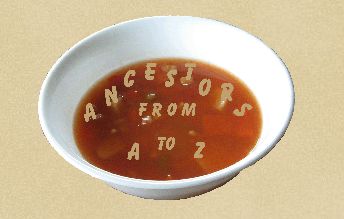Many of us have one - an ancestor who was a stinker, put quite frankly. And this can be quite a can of worms when writing and documenting our family histories.
I descend from William Nickerson, a fellow who gave the colonial government quite a run for their money back in the 1600s, and was well-documented for it. There are amply written, unbiased sources documenting his behaviors and punishments, and it's a part of who he was. He poses no problem for me in writing the family history - he was a character, and his own person, and no one is likely to be offended by what I write about him.
Then there's Aunt L. She's not so far back in history, having departed this life not quite 30 years ago. Many in the family still remember her. She left no descendants that might be more easily offended than the rest of us. But still, how exactly do I handle her in the family history?
She was my grandfather's aunt, and out of his own mouth come the memories of her locking he and is brothers in a dark closet and terrorizing them, and calling them names, because she hated their father. Or all of the Christmases that the girls got gifts and the boys got nothing. One of her nieces has less than fond memories of her as well, saying that she tried to cheat their mother out of anything that she could, be it family heirlooms, inheritance, or their brother's insurance money.
My own memories are much tamer, but then, Auntie was quite a bit older by the time I knew her. Once a year, at Christmas, we would gather at her house for a Christmas dessert and open small gifts. She got out the family china, and spent time trying to tell us about her father and mother, and trying to show a largely (unfortunately) uninterested bunch of people about the family history. No one, including me, seemed to care at the time. Under that tame exterior, though, still lurked the same anger and temper that she had as a young woman.
After a bad fall, she ended up having to go into a nursing home. She was furious. And it was my grandfather, the same little boy she terrorized as a child, who looked after her. He and my grandmother went to her house those last few years she lived there, and mowed the lawn, took her shopping, helped her clean, and visited with her... and in the nursing home, they went out twice a week to see her. One particular week, they took me with them. I was standing in the doorway when Auntie L., in a fit of rage, suddenly kicked her trash can violently out into the hallway. Two older gentlemen with walkers were approaching when the projectile shot out of her room, ricocheted on the opposite wall and came to rest in the middle of the hall. Without missing a beat, one of them said, "Well, looks like another one kicked the bucket!" Nursing home humor... not a great situation, but it has ended up being one of my favorite memories of Aunt L. It was so very... her.
So, do we try to leave future generations with positive impressions of their departed family members, or do we do our best to capture them as they were, warts and all? Should the wishes of other family members be taken into consideration, and if so, to what extent? Do we, as family historians, respect truth, or respect the dead? Is there a way to to both?

If they have been gone a long time I would post it like it was but if recently deceased no. You will probably will be writing what everyone else was thinking.
ReplyDeleteI vote warts and all. However, if the deceased still has living children. I'd probably keep the warts private for now. I never met my grandfather, but I have yet to hear one good thing about him. True, he had a rough childhood, but so have others who have managed to rise above it. So one day, I'll write about my grandfather so my children and grandchildren will know he was human, just like them.
ReplyDelete